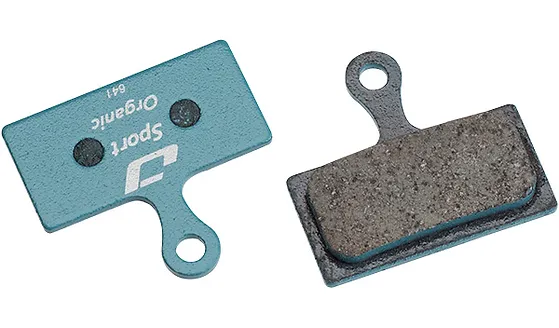Organic Brake Pads
In today’s world, where environmental consciousness is more critical than ever, sustainable choices in all aspects of life are gaining momentum. One area where this green revolution is particularly evident is in the world of cycling. As more and more people turn to bikes for their daily commute or recreational activities, the demand for eco-friendly bike components is on the rise. Among these components, organic brake pads for bikes have emerged as a game-changer. In this 900-word post, we will explore the significance of organic brake pads, their benefits, and how they contribute to a greener and safer cycling experience.

The Rise of Organic Brake Pads
Traditional brake pads for bicycles are typically made from non-renewable materials like rubber and various synthetic compounds. While they have served their purpose effectively, they come with a significant environmental cost. The production and disposal of these conventional brake pads contribute to pollution and resource depletion.
Enter organic brake pads, a sustainable alternative that has gained popularity among cyclists and environmental enthusiasts alike. These pads are typically made from organic materials such as cork, rubber, resins, and even Kevlar. What sets them apart is their commitment to reducing the carbon footprint of cycling while maintaining or even improving braking performance.
Environmental Benefits
Reduced Resource Consumption: these kind of brake pads are manufactured from renewable materials like cork, which can be harvested without harming the tree. This contrasts with traditional brake pads that require the extraction of non-renewable resources like petroleum for synthetic rubber production.
Biodegradability: One of the most significant advantages of organic brake pads is their biodegradability. When these pads wear down, they break down naturally into non-toxic substances, reducing the burden on landfills and minimizing environmental harm.
Lower Energy Consumption: The production of organic brake pads typically consumes less energy compared to their synthetic counterparts. This reduction in energy consumption results in a lower carbon footprint during the manufacturing process.
Non-Toxic Materials: Organic brake pads do not contain harmful chemicals or heavy metals commonly found in traditional brake pads. This makes them a safer choice for both the environment and the health of those involved in their production.
Performance and Safety
While the environmental benefits of organic brake pads are clear, many cyclists are understandably concerned about their performance and safety. Thankfully, these type of brake pads have come a long way in addressing these concerns:
Effective Stopping Power: Modern pads are engineered to provide excellent stopping power, often on par with or even surpassing traditional brake pads. This ensures that cyclists can ride confidently while knowing they have reliable brakes.
Less Noise and Vibration: these brake pads tend to produce less noise and vibration compared to their synthetic counterparts. This results in a quieter and more comfortable riding experience.
Heat Resistance: It has improved heat-resistant properties over the years, reducing the risk of brake fade during prolonged downhill rides.
Wet Weather Performance: Many organic pads are formulated to maintain their stopping power even in wet weather conditions, which is crucial for safety.
The Importance of Proper Maintenance
To maximize the benefits of these brake pads, proper maintenance is essential. Regularly inspecting and cleaning the brake pads and rotors, as well as ensuring proper bedding-in procedures, can significantly extend the lifespan. Additionally, it’s essential to use compatible brake fluids and follow manufacturer guidelines for installation and maintenance.
Conclusion
Organic brake pads for bikes represent a significant stride in the direction of eco-conscious cycling. With their sustainable materials, biodegradability, and impressive performance, they offer cyclists an opportunity to contribute to a greener planet without compromising safety or functionality. As the cycling community continues to grow and evolve, embracing environmentally friendly components like organic brake pads is a small yet impactful step toward a cleaner and more sustainable future. So, the next time you hop on your bike, consider making the switch to organic brake pads and join the green revolution on two wheels. Your planet and your fellow cyclists will thank you.
